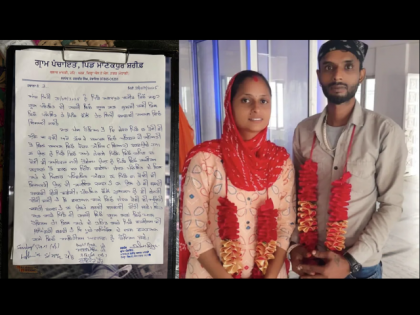Punjab Village Panchayat Bans Love Marriages Without Family Consent, Sparks Outrage
By Lokmat Times Desk | Updated: August 5, 2025 13:08 IST2025-08-05T13:07:12+5:302025-08-05T13:08:48+5:30
A gram panchayat in Manakpur Sharif village of Punjab’s Mohali district has stirred a major controversy after passing a ...

Punjab Village Panchayat Bans Love Marriages Without Family Consent, Sparks Outrage
A gram panchayat in Manakpur Sharif village of Punjab’s Mohali district has stirred a major controversy after passing a resolution that bans love marriages without the consent of families or the community. The village, just 10 kilometers from Chandigarh, unanimously adopted the resolution on July 31. The decision prohibits couples who marry without parental approval from residing in the village or surrounding areas and warns against supporting such unions. Village sarpanch Dalvir Singh defended the move, describing it as a preventive step to safeguard traditions and values rather than a punitive measure, reported India Today.
The sarpanch explained that the unusual step followed a recent incident where a 26-year-old man named Davinder married his 24-year-old niece, Baby. The couple has since left Manakpur Sharif, but the controversy has left a mark on the 2,000 residents of the village. Singh clarified that the panchayat was not opposing love marriages as a concept but was asserting its authority in restricting them within its jurisdiction. The resolution assigns collective responsibility to villagers for preventing such alliances and even encourages neighboring communities to adopt similar restrictions, according to India Today.
The resolution has triggered strong political reactions. Patiala Congress MP Dharamvira Gandhi slammed the panchayat’s decision, labeling it a “Talibani diktat.” He argued that the freedom to choose a life partner is a constitutional right of every adult citizen and stressed the state’s duty to protect individuals from such regressive dictates. Rights advocates also condemned the move, warning it undermines fundamental freedoms guaranteed by the Constitution. However, Singh and his supporters insist the resolution is essential to preserve cultural heritage, traditional values, and the social fabric of their village, reported India Today.
Despite the backlash, some villagers and local youth voiced support for the sarpanch. Speaking to India Today anonymously, they said the resolution was a reflection of the community’s desire to safeguard its legacy and reputation. They emphasized that while the world was modernizing rapidly, rural communities still had a responsibility to maintain their traditions and culture. Local authorities, meanwhile, adopted a cautious stance. Additional Deputy Commissioner (Rural) Sonam Chaudhary said that since the individuals were adults, they were legally free to marry, and no formal complaints had been filed yet in this matter.
Law enforcement officials reiterated the supremacy of the Constitution. Mohali Superintendent of Police Mohit Aggarwal asserted that no one could take the law into their own hands, stressing that India was not a “banana republic.” He added that while no official complaint had been received so far, any future grievance would be addressed strictly as per the law. Meanwhile, the couple at the heart of the controversy posted a video on social media confirming their marriage was consensual. They also accused villagers of defaming them, India Today reported.
The Punjab State Women Commission has also taken note of the issue. Chairperson Raj Lalli Gill strongly condemned the gram panchayat’s resolution, calling it unconstitutional and devoid of legal standing. Gill further emphasized that any such diktat issued by a panchayat carries no weight in the eyes of the law. She added that the commission had not yet received a formal complaint but would examine the matter closely. With political leaders, villagers, and authorities divided, the resolution has sparked a debate on the balance between cultural traditions and individual freedoms, India Today reported.
Open in app